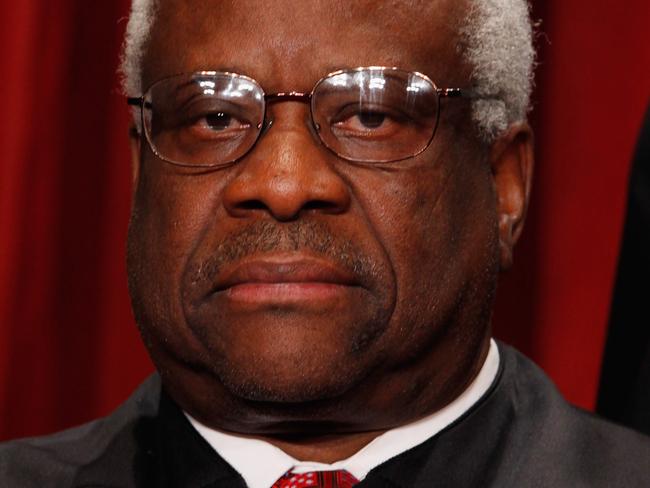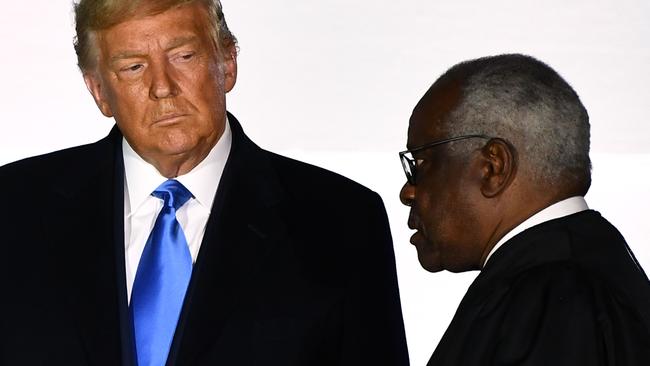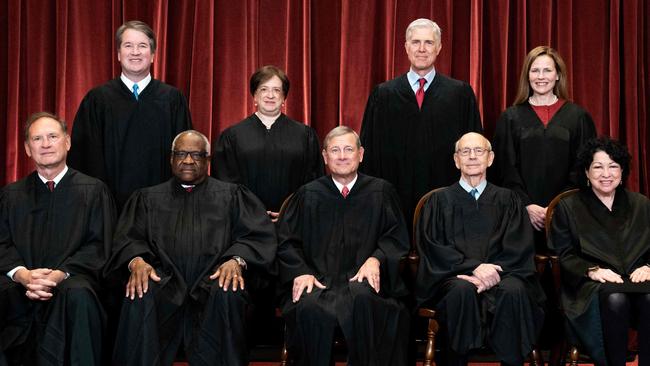Ominous sentence buried deep in Supreme Court’s abortion ruling
A whopping 119 pages into the US Supreme Court’s landmark ruling on abortion, you’ll find a particularly ominous sentence.

World
Don't miss out on the headlines from World. Followed categories will be added to My News.
Flip to page 119 of the US Supreme Court decision overturning its own landmark ruling on abortion rights, Roe vs Wade, and you will find a particularly ominous sentence.
Justice Clarence Thomas, one of the five conservatives who voted to scrap Roe, writes that the court “should reconsider” several other legal precedents as well.
“In future cases, we should reconsider all of this court’s substantive due process precedents, including Griswold, Lawrence and Obergefell,” Justice Thomas says.
I’ll explain what he means by “substantive due process” shortly.
First, know that the three cases he mentioned – decided in 1965, 2003 and 2015, respectively – gave Americans the rights to access contraception, have sexual relationships with members of the same sex, and marry partners of the same sex.
Justice Thomas’s words suggest those rights could now be under threat.
The significance of overturning Roe
The Supreme Court’s ruling in Roe vs Wade in 1973 had protected abortion rights in the United States for almost five decades.
Under the precedent it set, the nation’s state governments could only ban abortion from the point of “viability” onwards, i.e. the time at which a foetus can realistically survive outside the womb. That threshold is reached at about 23 or 24 weeks of pregnancy.
Friday’s ruling scraps that precedent, meaning state governments are now able to restrict abortion far earlier in a woman’s pregnancy, or ban it altogether.
More than a dozen states already had “trigger laws” on their books, ready to kick in if Roe was overturned. In most of those states, abortion has immediately become illegal. Other states will follow suit in the coming weeks.
Only 20 states have legal protections for abortion rights in place.
The upshot is that tens of millions of American women have now lost their right to access abortion services.
Stream more US news live & on demand with Flash. 25+ news channels in 1 place. New to Flash? Try 1 month free. Offer ends 31 October, 2022 >

Are more rights under threat?
The fifth and 14th amendments to the US Constitution say federal and state governments, respectively, cannot deprive citizens of “life, liberty or property without due process of law”. This is known as the Due Process Clause.
From that text, American courts have derived a longstanding principle called substantive due process. In simple terms, it’s the principle that some fundamental rights are protected from government interference, even if they’re not specifically mentioned in the Constitution.
That is how the Supreme Court justified its ruling in Roe vs Wade – it decided a woman’s right to have an abortion, which is never mentioned in the Constitution, was one of the rights protected by substantive due process.
The same logic has been used to underpin other rights, including those to which Justice Thomas alluded.
In his written opinion concurring with the court’s decision to overturn Roe on Friday, Justice Thomas argued that substantive due process was nonsense.
“As I have previously explained, ‘substantive due process’ is an oxymoron that ‘lacks any basis in the Constitution’. The resolution of this case is thus straightforward. Because the Due Process Clause does not secure any substantive rights, it does not secure a right to abortion,” he wrote.
“The court today declines to disturb substantive due process jurisprudence generally or the doctrine’s application in other, specific contexts. Cases like Griswold vs Connecticut (the right of married persons to obtain contraceptives), Lawrence vs Texas (the right to engage in private, consensual sexual acts), and Obergefell vs Hodges (the right to same-sex marriage) are not at issue.
“Thus, I agree that ‘nothing in (the court’s) opinion should be understood to cast doubt on precedents that do not concern abortion’.”
No worries then, right? Not so fast. Justice Thomas had more to say.

“For that reason, in future cases, we should reconsider all of this court’s substantive due process precedents, including Griswold, Lawrence and Obergefell,” he continued.
“Because any substantive due process decision is demonstrably erroneous, we have a duty to correct the error established in those precedents.
“After overruling these demonstrably erroneous decisions, the question would remain whether other constitutional provisions guarantee the myriad rights that our substantive due process cases have generated. For example, we could consider whether any of the rights announced in this court’s substantive due process cases are privileges or immunities of citizens of the United States protected by the Fourteenth Amendment.
“To answer that question, we would need to decide important antecedent questions, including whether the Privileges or Immunities Clause protects any rights that are not enumerated in the Constitution and, if so, how to identify those rights.”
Translating that into plainer English, Justice Thomas believes the Supreme Court should reconsider, and perhaps strike down, other rights protected by substantive due process.
That means same-sex marriage, contraception and more.

Conservatives insist ‘no other right’ affected
The court’s three progressive justices – Stephen Breyer, Sonia Sotomayor and Elena Kagan – co-wrote the dissenting opinion in Friday’s judgment.
They expressed their fear that Justice Thomas could get what he wanted.
“We cannot understand how anyone can be confident that today’s opinion will be the last of its kind,” they wrote.
“Consider contraception. The Constitution, of course, does not mention that word. And there is no historical right to contraception, of the kind the majority insists on. To the contrary, the US legal landscape in the decades after the Civil War was littered with bans on the sale of contraceptive devices.
“If the majority is serious about its historical approach, then Griswold and its progeny are in the line of fire too. Or if it is not serious, then ... what is the basis of today’s decision?
“If we had to guess, we suspect the prospects of this court approving bans on contraception are low. But the future significance of today’s opinion will be decided in the future. At the least, today’s opinion will fuel the fight to get contraception, and any other issues with a moral dimension, out of the Fourteenth Amendment and into state legislatures.”

However, conservative Justice Samuel Alito – who wrote the court’s majority opinion – repeatedly stressed the ruling had nothing to do with anything other than abortion.
Indeed, Justice Thomas was the only member of the court to suggest other rights protected by substantive due process should be revisited.
Justice Alito argued Roe was different to the other precedents in question because it was the only one that involved “potential life”.
“It is impossible to defend Roe based on prior precedent because all of the precedents Roe cited, including Griswold and Eisenstadt, were critically different,” he wrote.
“None of those cases involved the destruction of what Roe called ‘potential life’.”
A few pages later he returned to the issue, sniping at the dissenters’ logic and calling their fear for other rights “unfounded”.
“The most striking feature of the dissent is the absence of any serious discussion of the legitimacy of the states’ interest in protecting foetal life. This is evident in the analogy that the dissent draws between the abortion right and the rights recognised in Griswold (contraception), Eisenstadt (same), Lawrence (sexual conduct with a member of the same sex) and Obergefell (same-sex marriage),” he said.
“Perhaps this is designed to stoke unfounded fear that our decision will imperil those other rights, but the dissent’s analogy is objectionable.
“The exercise of the rights at issue in Griswold, Eisenstadt, Lawrence and Obergefell does not destroy a ‘potential life’, but an abortion has that effect.
“So if the rights at issue in those cases are fundamentally the same as the right recognised in Roe, the implication is clear: the Constitution does not permit the states to regard the destruction of a ‘potential life’ as a matter of any significance.
“That view is evident throughout the dissent.”

When I used the word “repeatedly” earlier, I wasn’t exaggerating. Justice Alito brought up the argument a further two times.
“To ensure that our decision is not misunderstood or mischaracterised, we emphasise that our decision concerns the constitutional right to abortion and no other right,” he stressed.
“Nothing in this opinion should be understood to cast doubt on precedents that do not concern abortion.”
“It is hard to see how we could be clearer,” he added later.
“Even putting aside that these cases are distinguishable, there is a further point that the dissent ignores: each precedent is subject to its own stare decisis (precedent) analysis, and the factors that our doctrine instructs us to consider like reliance and workability are different for these cases than for our abortion jurisprudence.”
In other words: calm down.
The right Justice Thomas didn’t mention
Today Jim Obergefell, the plaintiff in the case that established a right to same-sex marriage, criticised Justice Thomas on CNN.
He noted that Justice Thomas had omitted something from his list of rights the court should reconsider: the right to interracial marriage, established by Loving vs Virginia in 1967.
Justice Thomas, who is African-American, is married to a caucasian woman.
“To me it’s a clear indication that if it’s a case that impacts him directly, it’s safe. But if it’s a case that protects other people – other people who are unlike him – then we’re not very safe,” said Mr Obergefell.
“The right to interracial marriage is only six years older than a woman’s right to abortion. Our nation has a much longer history of denying interracial marriage.
“Do we want to go back to the late 18th century, the originalist who is saying we can only interpret the Constitution as of the time it was written? When the Constitution was written, ‘We the People’ did not include black people, or indigenous people. It didn’t include women, it did not include queer people.”
He said the overturning of Roe was a “terrible decision” and the Supreme Court was taking the US “backwards”.
Originally published as Ominous sentence buried deep in Supreme Court’s abortion ruling





